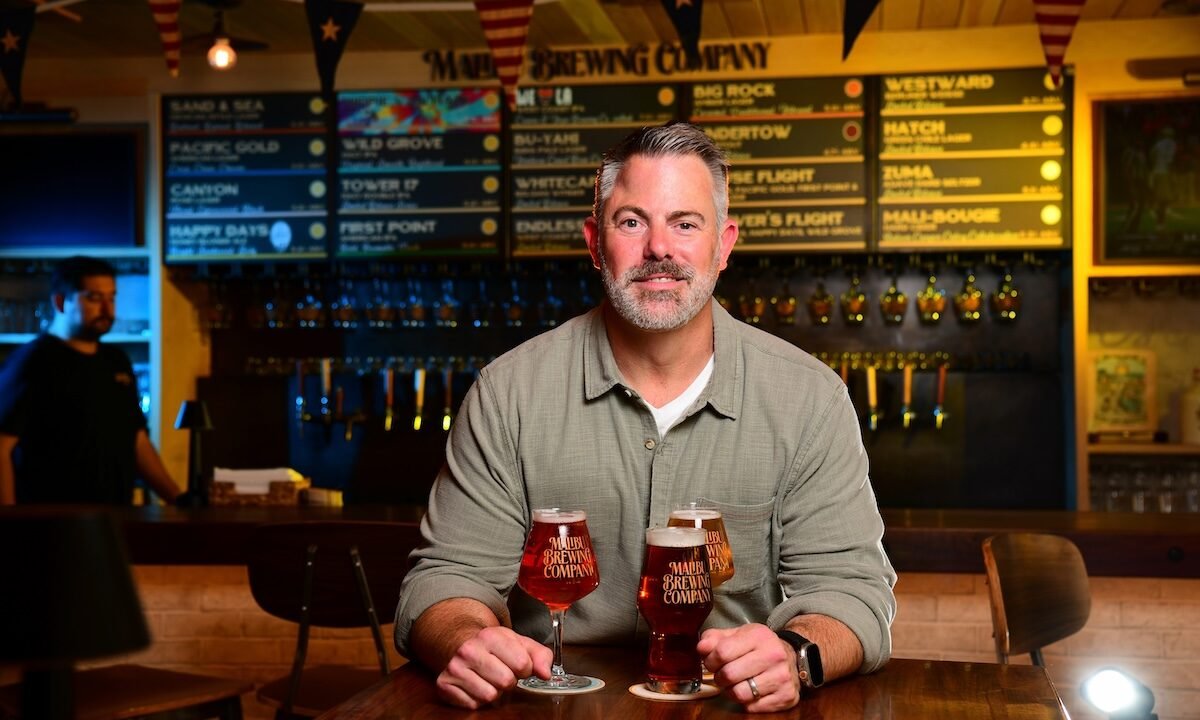
To say craft beer brewers have learned how to be nimble might be an understatement.
Five years ago, the diverse and booming industry, driven primarily by social gatherings, had to contend with near-universal orders to close doors and limit those gatherings. In the years following that, increased labor costs and real estate were compounded by mounting inflation. And now this year, on-and-off tariffs are creating a wake of anxiety and confusion regarding the future prices of those same supplies.
“It’s probably whatever every other restaurant is seeing,” said Ryan Ahrens, founder of Malibu Brewing Co. “Labor’s expensive; utilities are expensive. Everything has gone up, but you can only raise your prices in the taproom by so much.”
These troubles have combined with other realities of rapidly growing industries – supply and demand issues, saturation, shifting consumer habits – to make the past several years ones of growing pains for craft breweries. And yet, brewers are famously collegial among themselves and scrappy. Many have successfully endured the challenges.
“We’re tightly monitoring the cost of everything, but in the end, we’ve been able to navigate to American suppliers for a lot of things or inventories that existed pre-tariff,” said Brian Schmitz, a co-founder of Lucky Luke Brewing Co. in Palmdale. “As much as we have on our plate, it wasn’t something I was willing to let our team get worked up over. We’re not in a terrible position financially, fortunately.”
Ahrens had something unique to contend with this year: the closure of the Pacific Coast Highway – where his brewery’s taproom is located – on account of the Palisades Fire cleanup. The location itself was unscathed by the fires and subsequent mudslides. However, customers were forced to wind through the canyon roads via the already crowded 101 freeway.
“All of the visitors that Malibu businesses count on, especially for hospitality, just weren’t coming, even though it seemed kind of normal on our end of town,” Ahrens said. “Business was down pretty substantially at the beginning of the year. Summer has come back for us. The summer crowds feel like they’re starting to come back. It seems like people are making their way back out to Malibu.”


Malibu Brewing stayed busy though. Shortly after the fire devastated the Pacific Palisades and other surrounding areas, the operation partnered with World Central Kitchen and distributed more than 20,000 meals to displaced residents. It also partnered with others in the Los Angeles County Brewers Guild to produce the “We Love L.A.” brew, which was used as a fundraiser by participating breweries.
Malibu Brewing’s production facility in Westlake Village was unaffected by the fires.
“Even now, we’re still giving meals to the Boys and Girls Club of Malibu while they help get people in the community lives get back together,” Ahrens added.
Craft beer has spent the last 15 years skyrocketing in the United States.
According to the Brewers Association – a trade group based in Colorado – there were 1,813 breweries in the United States in 2010. Last year, that number was 9,922. The association reported that craft beer contributed about $77.1 billion to the U.S. economy last year and supported nearly 460,000 jobs.
That spurt may be at a plateau. The association also reported that there were more closings than openings nationwide last year among brewpubs, microbreweries and taprooms – reversing a trend that started in 2010. And while business turnover is natural, industry contractions are affecting legacy players the same they are newer, smaller operations. Anchor Brewing Co. in San Francisco – founded in 1896, then the oldest brewery in the nation – shuttered in 2023, although the billionaire owner of Chobani acquired its assets and aims to restart it. After spending $1 billion in 2016 to acquire San Diego beer stalwart Ballast Point Brewing Co., Constellation Brands offloaded the company for just $41.1 million in 2019.
Locally, Eagle Rock Brewery – which when it opened in 2009 was the city of L.A.’s first new brewery in six decades – shut down a year ago. After nine years of operation and a last-ditch fundraising campaign, Brouwerij West in San Pedro closed in March, while Sage Plant Bistro & Brewery in Echo Park closed in January after 14 years. Ladyface Brewery in Agoura Hills also closed in January.
“We’re seeing an equal or larger amount of closing points than openings,” Schmitz noted.
Closures also create opportunity. Schmitz’s Lucky Luke, which also has a Lancaster taproom, took over the former Wolf Creek Restaurant & Brewery in Santa Clarita. Also in Santa Clarita, one of the former owners of Telco Brewery simply acquired all of its old assets and relaunched last year as Santa Cruz Brewing Co. Ahrens noted that Malibu Brewing was in “growth mode,” planning an Agoura Hills opening soon and at least a third location elsewhere in the county.
Tastes are changing, too. Alcoholic seltzers boomed in the late 2010s and most breweries will offer at least one. Nonalcoholic beer sales grew 9% globally last year, according to London-based research firm IWSR. That firm projects nonalcoholic sales will overtake ales and become the second best-selling beer type by the end of this year.
“The landscape overall is just changing quite a bit for craft brewers,” Schmitz said. “Our customer base is changing and we’re trying to figure out how to adjust our business model to appeal to a newer and younger audience to appeal to their tastes.
“Everything has changed,” he continued, “and we’re just rolling with the changes.”
Ben Turkel at Little Tokyo’s Boomtown Brewery had three things on his mind when asked about changes in supply costs.
One was the brewery’s grain contract, which is renewed annually. The second was its can deal, which runs two years. Third was their hops deals, which run three years but are renewed annually on account of their growth period.
Turkel, who is operations manager at Boomtown, said each summer involves conversations with their suppliers. “The grain one is going to be my most interesting conversation,” he said. “A lot of it – I’d say 90% – is coming from Canada and the European Union. With the Canadian stuff, which is my bulk silo malt, a (large) increase on that is really going to change the game and I’m really interested in what my supplier has to say.”


President Donald Trump’s tariffs on Canadian imports currently stands at 25%, while the European Union has a 20% tax. Turkel said European Union suppliers have largely decided to eat the costs for the immediate future because it’s not completely clear how things will shake out. Trump himself has repeatedly paused and brought back tariffs, and last week threatened to again increase them.
“If things stick and tariffs increase, these guys may come back and say they can only eat 50% of this cost. That will be a discussion I’ll probably have in the coming weeks, too,” Turkel said. “Generally speaking, beer is water followed by grain. Grain is your second input and depending on style, arguably the most expensive input.”
Boomtown’s hops are usually sourced in Oregon, but the federal government’s recent crackdowns on undocumented immigrants – particularly on the West Coast – have sent shockwaves through the agricultural industry.
Additionally, Boomtown goes through anywhere between 350,000 and 500,000 cans annually, Turkel added. Prices went up 15% during the first Trump Administration, he recalled.
“All of the cans that we use are manufactured in America,” he added, “but of course the aluminum, the physical ingots, are coming from overseas, so that’s going to be an interesting situation as well.”
Ahrens at Malibu Brewing also expressed concern with aluminum prices, as his operation was due to reup on its cans soon.
“We get a lot of our cans printed, so we ordered a bunch of them at the beginning of the year, up front,” he added. “We’re getting ready for this next round, but I haven’t seen a huge price increase on the supplier side for aluminum yet. Everything has seemed high since the pandemic, but we haven’t said we have to change our recipes or change suppliers or anything. We haven’t seen those price changes come through.”
Schmitz said he understands the knee-jerk reactions to economic policy changes, particularly among small business owners, but he has worked to keep his team focused and not anxious about what might materialize. So far, he said, Lucky Luke has functioned on pre-tariff inventory this year.
“We’ve been through that whipsaw action all the way through Covid and all of that inflation, so the tariff stuff is kind of part and parcel. We’ve been doing this for five years now, right?” he added. “When we do the math, for our component, it’s pretty negligible and with our suppliers, we’re dealing with people with huge amount of supply on hand.”









